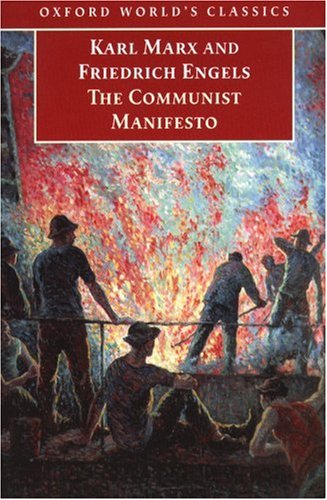
Ultimately, it seems to me like a product of the 'revolutionary' nature of the latter half of the 18th and beginning of the 19th century, which, with the beginnings of modernity, experienced paradigm shifts in the organization of state, finances, and military. As such, it's easy to understand the revolutionary fervor with which Marx and Engels present this Manifesto, their vision of the Communism. I understand (and don't disagree with) their criticisms of capitalist philosophy of labor and property, but I don't understand why he believes that a state created by a proletariat revolution would be anything but a continuation of the previous state. There is simply no way to maintain a state without exploitation of it's constituent members, as oppression is necessarily a function of the state. As Rousseau said, the state is merely a scheme by which the rich have convinced the poor to defend the property of the rich. Marx essentially believes that with the collapse of the feudal economic model, we have a new class which holds all the economic power - the bourgeois, the capitalists. Through their control of private property they alienate man from the product of his labor, making him essentially a wage-slave. He believes that it is INEVITABLE, in the rational progress of history, that this penultimate model, the purest of class struggles, will be replaced by Communism.
Marx's call to revolution is NOT just an economic, or even a political, one. It is a total paradigm shift in all modes of thought - cultural, economic, political, philsophical, educational. It is about blowing up all the structures of society and a complete and total reorganization of the way in which we manage people and resources. From what I understand, it is that when the proletariat rise up and gain a democratic and centralized control over the means of production, the "state", in the traditional sense, becomes superfluous, and dissolves as a result, leaving us with a fair and equal mode of distributing resources among people. In order to achieve this, the working classes must institute a total overthrow of EVERY societal institution that supports the bourgeoisie (i.e., every social institution).
The whole time I kept thinking that he was too caught up with believing that the Communist Revolution was in his particular stage of history, and that maybe it was still far into the future. I keep imagining this sort of gradual disconnect of the population from the state as it becomes increasingly irrelevant in a highly technologized society, ultimately resulting in a decentralized power structure spread among a gradually equalizing population. Perhaps we're still a few class struggles away from practical communism? With the creeping development of the mass surveillance state, which I believe is fundamentally unsustainable in the long run, perhaps we are seeing the beginnings of the true final stage of economic history? I mean, Marx may be right. Maybe we're all ready there, and it is all of us versus the bourgeoisie. After all, the top 1 percent currently control 35.6% of the world's private wealth, more than the bottom 95% combined. Maybe, in the midst of the revolutionary spirit of his time, Marx simply failed to see that the final game would be a long one.
There's a lot going on in this slim volume (68 pages, as I read it), and I haven't even touched on some of the less interesting, to me at least, sections. Ultimately, I was approaching this as a piece of philosophy, and it certainly is fascinating, though I can't say that I've been swayed to Marxism by any means. It is quite stirring at times, if perhaps a bit underdeveloped (by design, I imagine, as it was essentially a piece of propoganda). I do intend to read further, so in that respect, at least, the Manifesto was successful. It's sort of tragically humorous how totally skewed the layman's perception of Communism is; and much more tragic, and much less funny, how massively every communist state has failed in truly shaking off the functional structures of oppression, how deeply and utterly they failed the oppressed.

